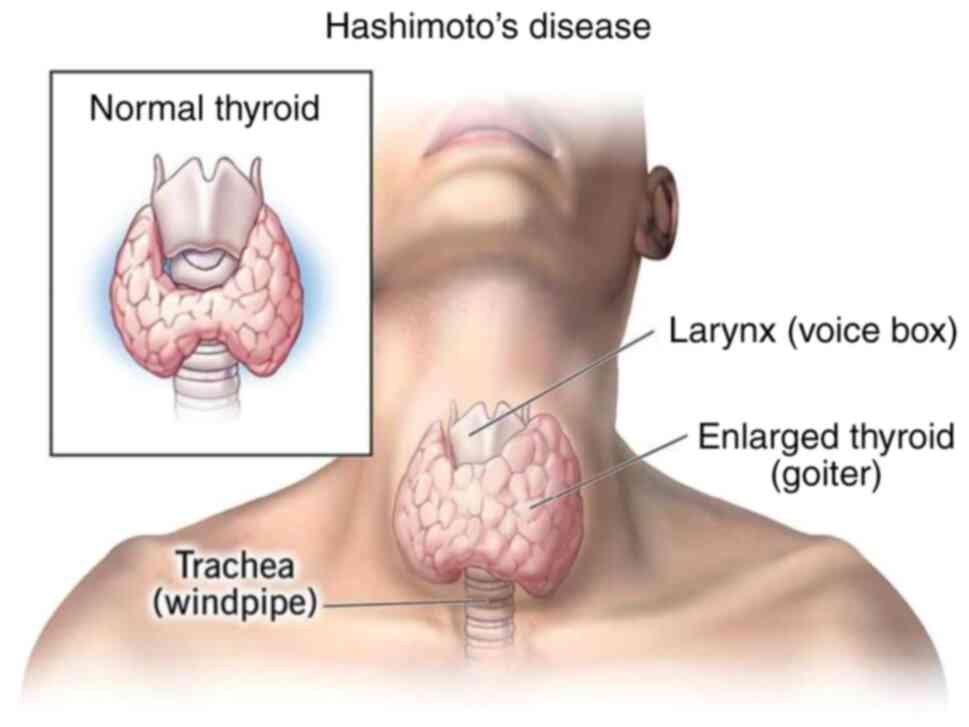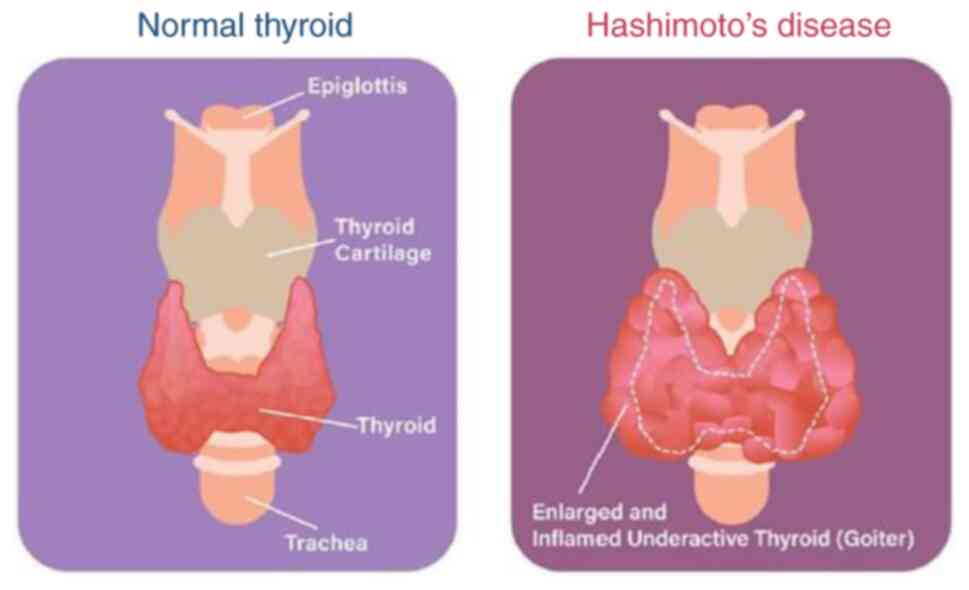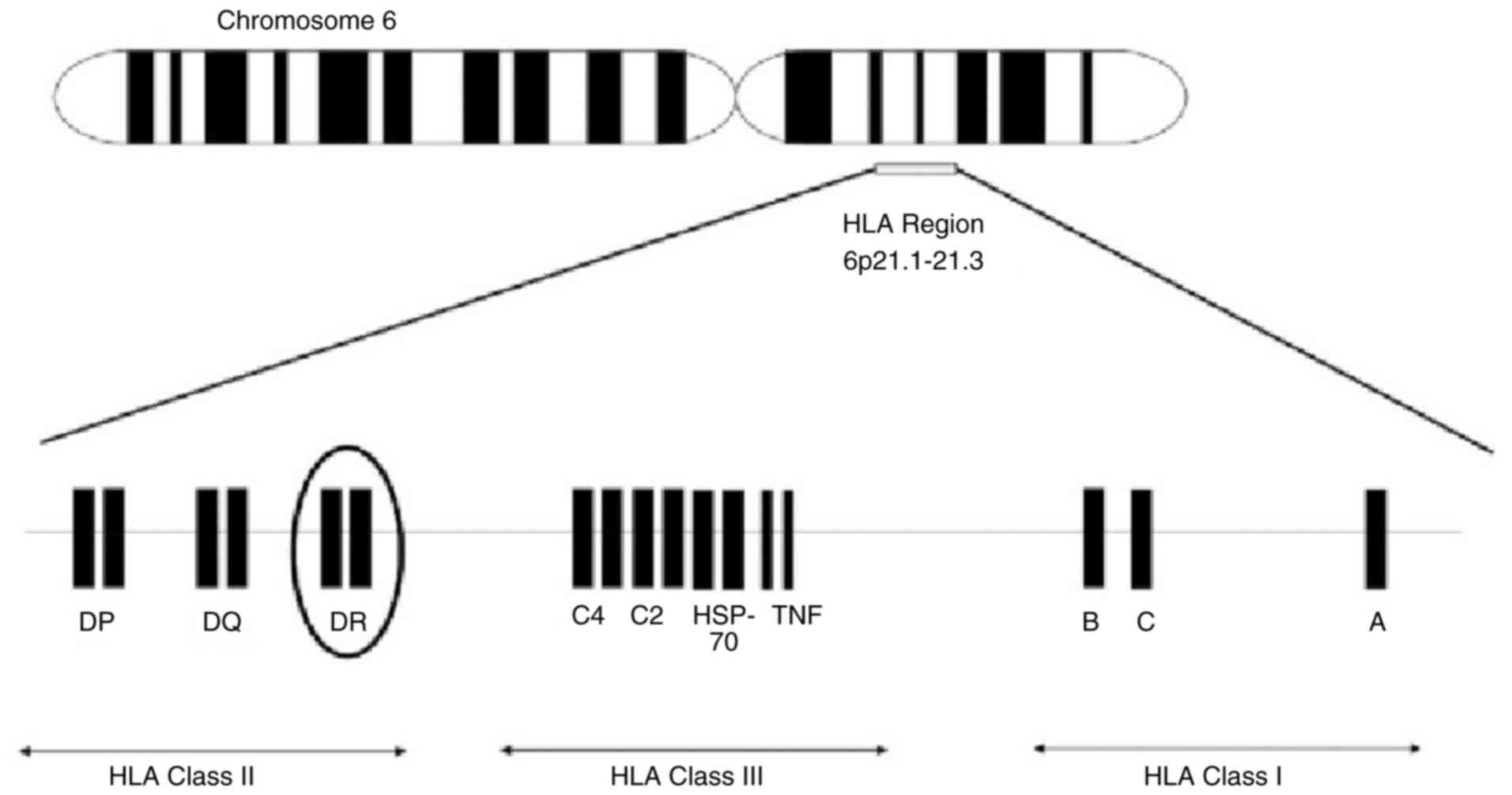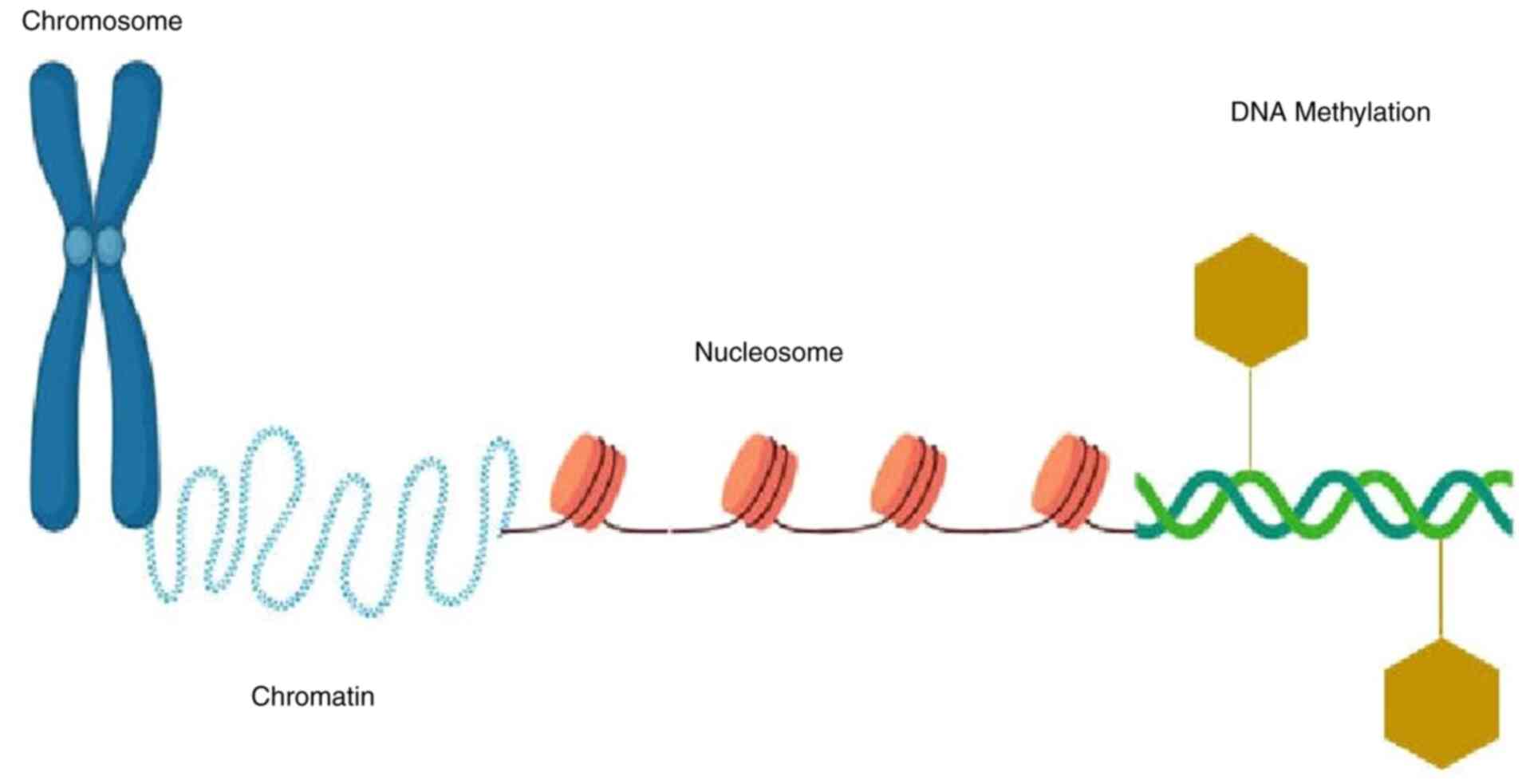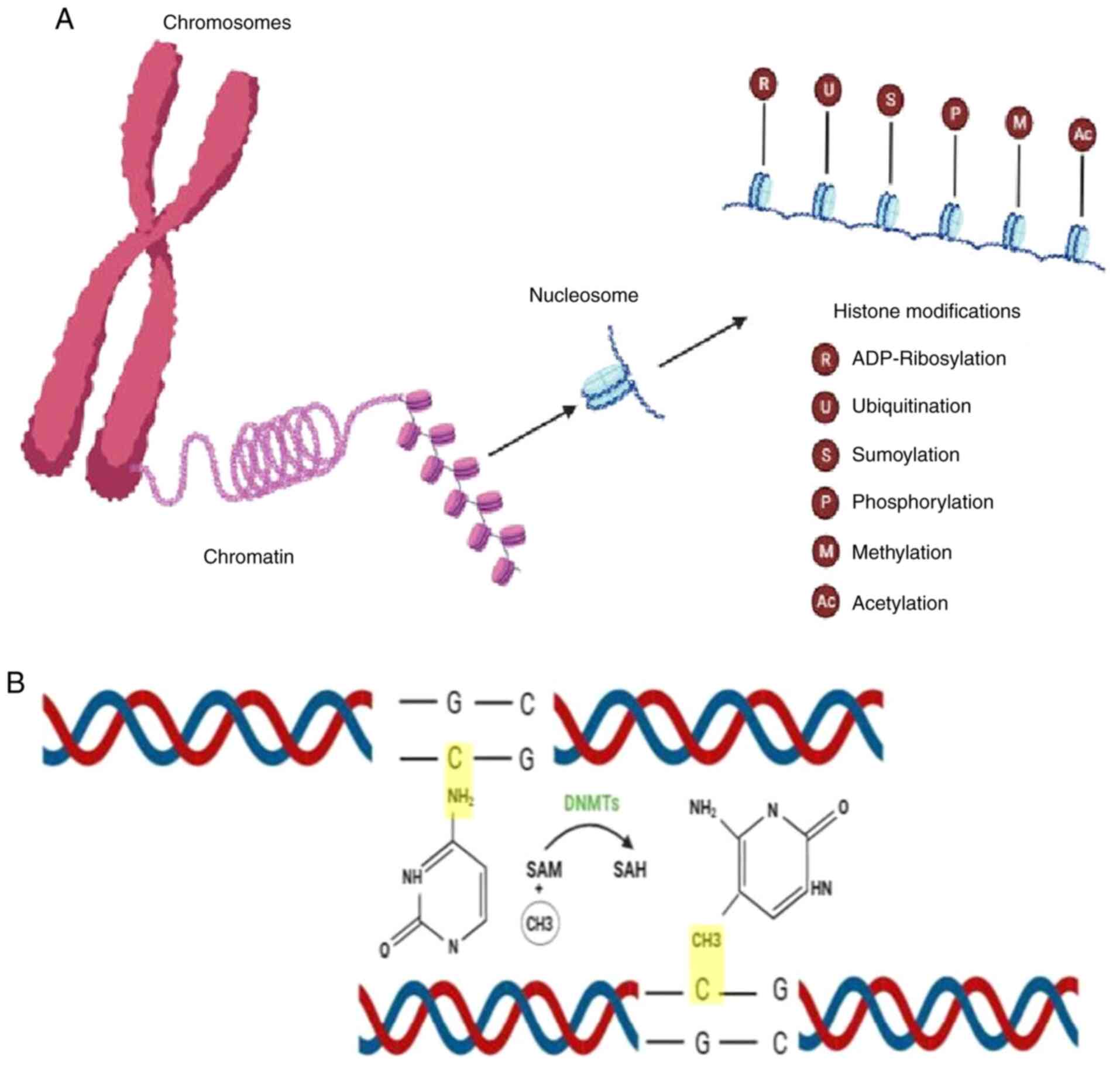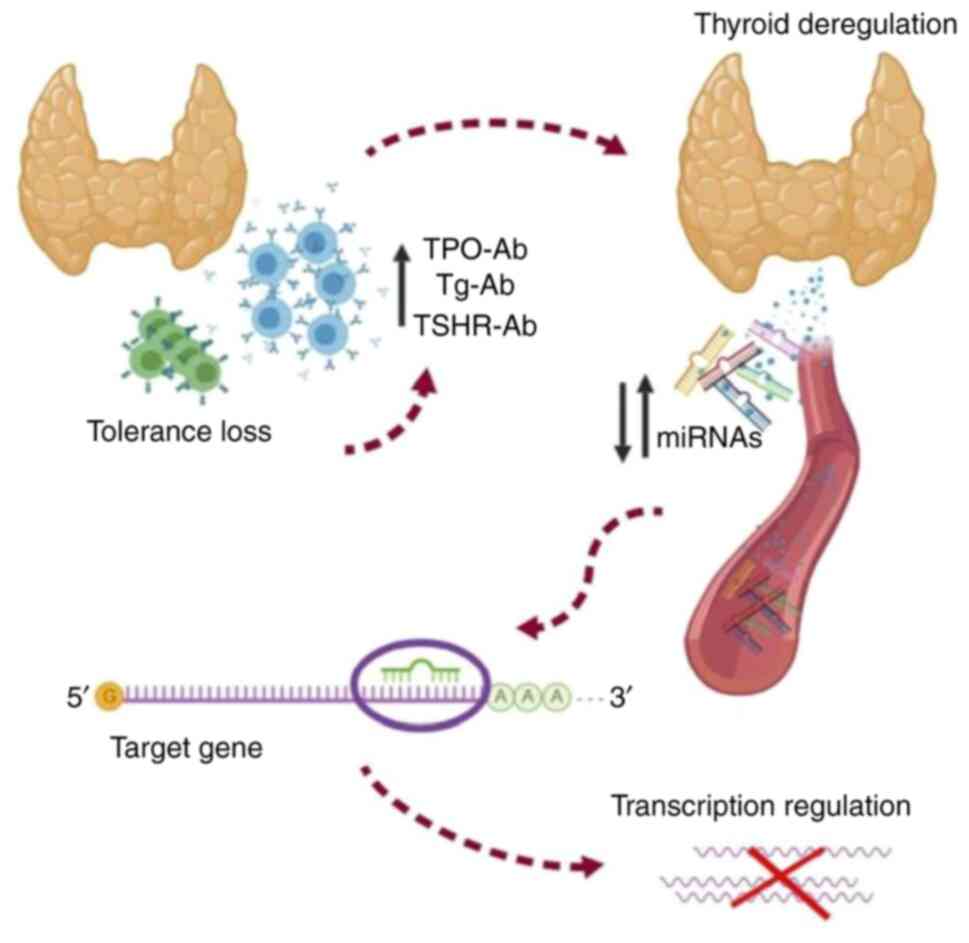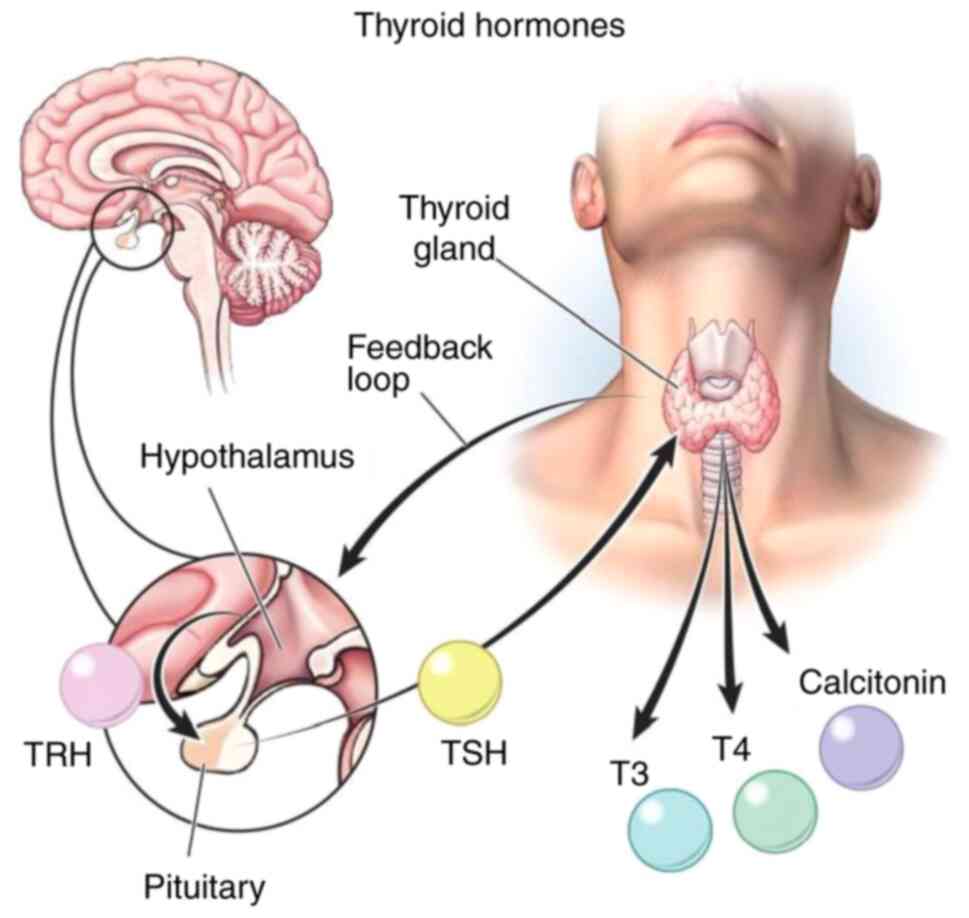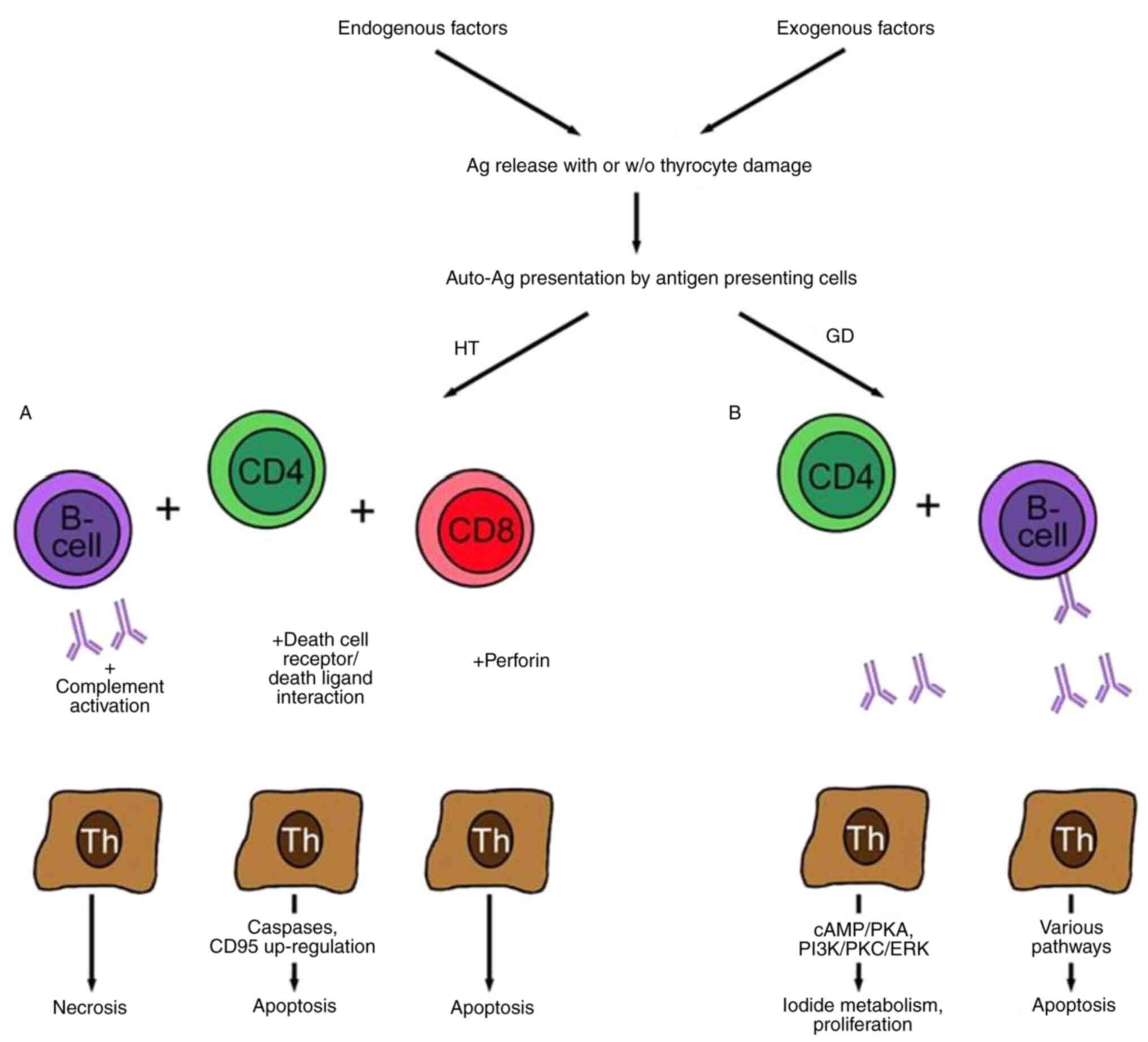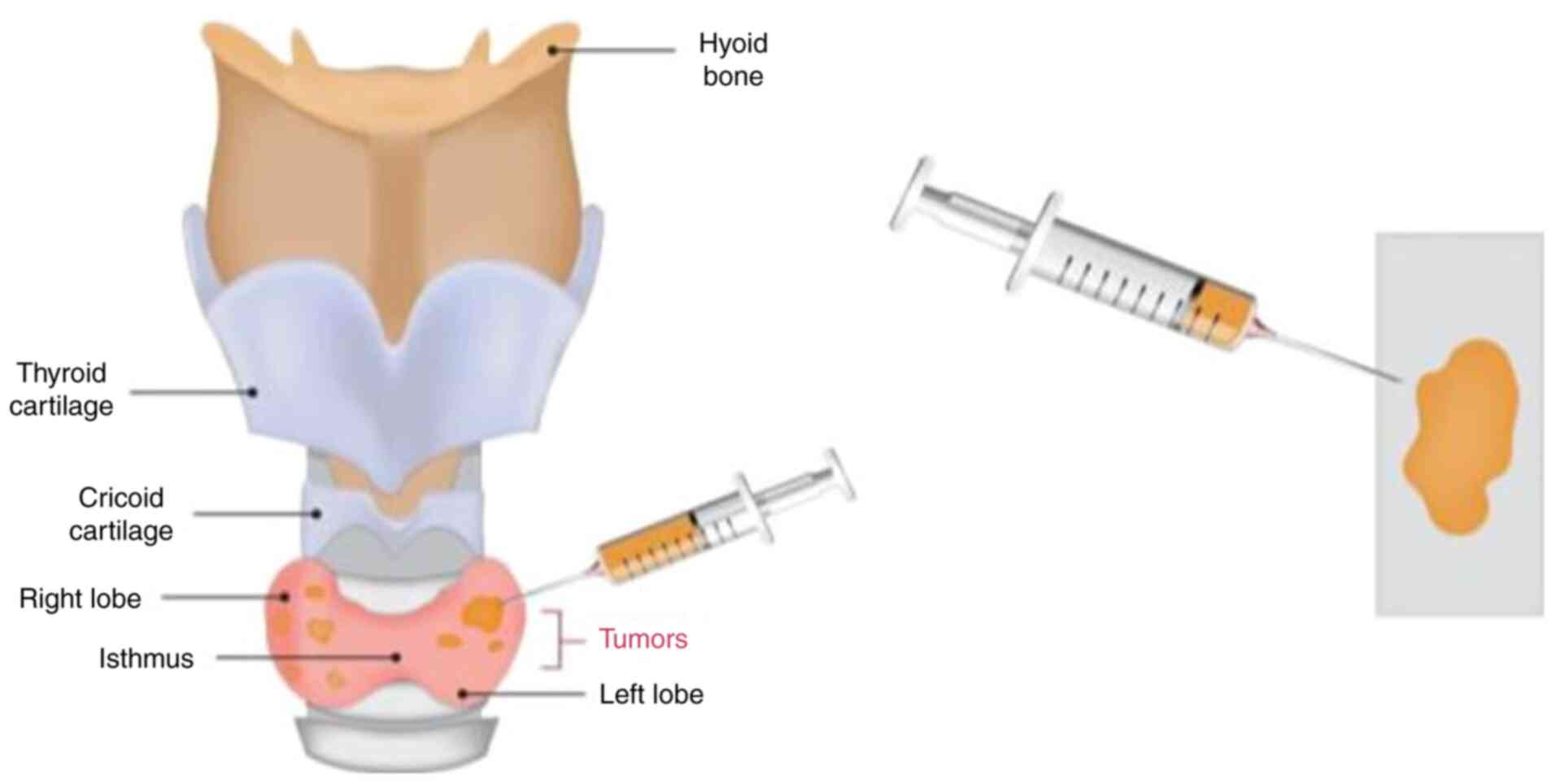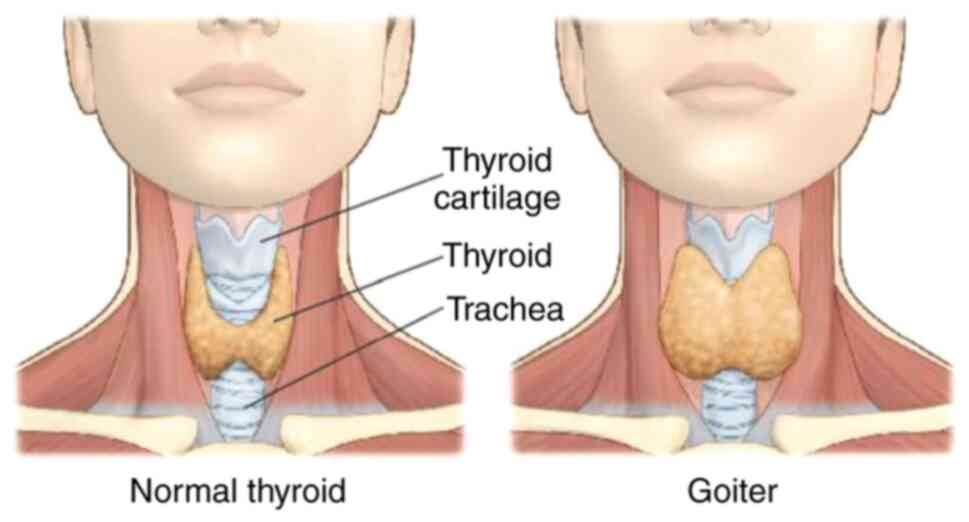|
1
|
Weetman AP: An update on the pathogenesis
of Hashimoto's thyroiditis. J Endocrinol Invest. 44:883–890.
2021.PubMed/NCBI View Article : Google Scholar
|
|
2
|
Ralli M, Angeletti D, Fiore M, D'Aguanno
V, Lambiase A, Artico M, de Vincentiis M and Greco A: Hashimoto's
thyroiditis: An update on pathogenic mechanisms, diagnostic
protocols, therapeutic strategies, and potential malignant
transformation. Autoimmun Rev. 19(102649)2020.PubMed/NCBI View Article : Google Scholar
|
|
3
|
Mincer DL and Jialal I: Hashimoto
Thyroiditis. In: StatPearls. StatPearls Publishing, Treasure
Island, FL, 2024.
|
|
4
|
de Oliveira Andrade LJ, de Oliveira LM, de
Oliveira LCM and de Oliveira GCM: Bioinformatics unravels the
epigenetic mechanisms of hashimoto's thyroiditis: Deciphering
molecular complexity. medrxiv: doi: https://doi.org/10.1101/2023.07.25.23293163.
|
|
5
|
Pyzik A, Grywalska E, Matyjaszek-Matuszek
B and Roliński J: Immune disorders in Hashimoto's thyroiditis: What
do we know so far? J Immunol Res. 2015(979167)2015.PubMed/NCBI View Article : Google Scholar
|
|
6
|
Danailova Y, Velikova T, Nikolaev G,
Mitova Z, Shinkov A, Gagov H and Konakchieva R: Nutritional
management of thyroiditis of hashimoto. Int J Mol Sci.
23(5144)2022.PubMed/NCBI View Article : Google Scholar
|
|
7
|
Mikulska AA, Karaźniewicz-Łada M,
Filipowicz D, Ruchała M and Główka FK: Metabolic characteristics of
hashimoto's thyroiditis patients and the role of microelements and
diet in the disease management-an overview. Int J Mol Sci.
23(6580)2022.PubMed/NCBI View Article : Google Scholar
|
|
8
|
Caturegli P, De Remigis A and Rose NR:
Hashimoto thyroiditis: Clinical and diagnostic criteria. Autoimmun
Rev. 13:391–397. 2014.PubMed/NCBI View Article : Google Scholar
|
|
9
|
Ihnatowicz P, Drywień M, Wątor P and
Wojsiat J: The importance of nutritional factors and dietary
management of Hashimoto's thyroiditis. Ann Agric Environ Med.
27:184–193. 2020.PubMed/NCBI View Article : Google Scholar
|
|
10
|
Casto C, Pepe G, Li Pomi A, Corica D,
Aversa T and Wasniewska M: Hashimoto's thyroiditis and graves'
disease in genetic syndromes in pediatric age. Genes (Basel).
12(222)2021.PubMed/NCBI View Article : Google Scholar
|
|
11
|
Aversa T, Corica D, Zirilli G, Pajno GB,
Salzano G, De Luca F and Wasniewska M: Phenotypic expression of
autoimmunity in children with autoimmune thyroid disorders. Front
Endocrinol (Lausanne). 10(476)2019.PubMed/NCBI View Article : Google Scholar
|
|
12
|
Bender J: DNA methylation and epigenetics.
Annu Rev Plant Biol. 55:41–68. 2004.PubMed/NCBI View Article : Google Scholar
|
|
13
|
Jones PA and Takai D: The role of DNA
methylation in mammalian epigenetics. Science. 293:1068–1070.
2001.PubMed/NCBI View Article : Google Scholar
|
|
14
|
Lennartsson A and Ekwall K: Histone
modification patterns and epigenetic codes. Biochim Biophys Acta.
1790:863–868. 2009.PubMed/NCBI View Article : Google Scholar
|
|
15
|
Zhang Y, Sun Z, Jia J, Du T, Zhang N, Tang
Y, Fang Y and Fang D: Overview of histone modification. Adv Exp Med
Biol. 1283:1–6. 2021.PubMed/NCBI View Article : Google Scholar
|
|
16
|
Zadeh-Vakili A, Faam B, Afgar A, Razmpoosh
E, Zarkesh M and Amouzegar A: A systematic review of dysregulated
microRNAs in Hashimoto's thyroiditis. Endocrine. 84:800–811.
2024.PubMed/NCBI View Article : Google Scholar
|
|
17
|
Brom VC, Burger C, Wirtz DC and Schildberg
FA: The role of immune checkpoint molecules on macrophages in
cancer, infection, and autoimmune pathologies. Front Immunol.
13(837645)2022.PubMed/NCBI View Article : Google Scholar
|
|
18
|
van Zuuren EJ, Albusta AY, Fedorowicz Z,
Carter B and Pijl H: Selenium supplementation for Hashimoto's
thyroiditis. Cochrane Database Syst Rev.
2013(CD010223)2013.PubMed/NCBI View Article : Google Scholar
|
|
19
|
Boelaert K, Newby PR, Simmonds MJ, Holder
RL, Carr-Smith JD, Heward JM, Manji N, Allahabadia A, Armitage M,
Chatterjee KV, et al: Prevalence and relative risk of other
autoimmune diseases in subjects with autoimmune thyroid disease. Am
J Med. 123:183.e1–e9. 2010.PubMed/NCBI View Article : Google Scholar
|
|
20
|
Özen S, Berk Ö, Şimşek DG and Darcan S:
Clinical course of Hashimoto's thyroiditis and effects of
levothyroxine therapy on the clinical course of the disease in
children and adolescents. J Clin Res Pediatr Endocrinol. 3:192–197.
2011.PubMed/NCBI View Article : Google Scholar
|
|
21
|
Berghi NO: Immunological mechanisms
implicated in the pathogenesis of chronic urticaria and Hashimoto
thyroiditis. Iran J Allergy Asthma Immunol. 16:358–366.
2017.PubMed/NCBI
|
|
22
|
Chaker L, Razvi S, Bensenor IM, Azizi F,
Pearce EN and Peeters RP: Hypothyroidism. Nat Rev Dis Primers.
8(30)2022.PubMed/NCBI View Article : Google Scholar
|
|
23
|
Taheri M, Eghtedarian R, Dinger ME and
Ghafouri-Fard S: Dysregulation of non-coding RNAs in autoimmune
thyroid disease. Exp Mol Pathol. 117(104527)2020.PubMed/NCBI View Article : Google Scholar
|
|
24
|
Fariduddin MM and Singh G: Thyroiditis.
In: StatPearls. StatPearls Publishing, Treasure Island, FL,
2024.
|
|
25
|
Bogusławska J, Godlewska M, Gajda E and
Piekiełko-Witkowska A: Cellular and molecular basis of thyroid
autoimmunity. Eur Thyroid J. 11(e210024)2022.PubMed/NCBI View Article : Google Scholar
|
|
26
|
Ragusa F, Fallahi P, Elia G, Gonnella D,
Paparo SR, Giusti C, Churilov LP, Ferrari SM and Antonelli A:
Hashimotos' thyroiditis: Epidemiology, pathogenesis, clinic and
therapy. Best Pract Res Clin Endocrinol Metab.
33(101367)2019.PubMed/NCBI View Article : Google Scholar
|
|
27
|
Biondi B, Cappola AR and Cooper DS:
Subclinical hypothyroidism: A review. JAMA. 322:153–160.
2019.PubMed/NCBI View Article : Google Scholar
|
|
28
|
Akamizu T and Amino N: Hashimoto's
Thyroiditis. MDText.com, Inc., South Dartmouth, MA, 2000.
|
|
29
|
Radetti G: Clinical aspects of Hashimoto's
thyroiditis. Endocr Dev. 26:158–170. 2014.PubMed/NCBI View Article : Google Scholar
|
|
30
|
Malandrini S, Trimboli P, Guzzaloni G,
Virili C and Lucchini B: What about TSH and anti-thyroid antibodies
in patients with autoimmune thyroiditis and celiac disease using a
gluten-free diet? A systematic review. Nutrients.
14(1681)2022.PubMed/NCBI View Article : Google Scholar
|
|
31
|
Rayman MP: Multiple nutritional factors
and thyroid disease, with particular reference to autoimmune
thyroid disease. Proc Nutr Soc. 78:34–44. 2019.PubMed/NCBI View Article : Google Scholar
|
|
32
|
Dong YH and Fu DG: Autoimmune thyroid
disease: Mechanism, genetics and current knowledge. Eur Rev Med
Pharmacol Sci. 18:3611–3618. 2014.PubMed/NCBI
|
|
33
|
Osowiecka K and Myszkowska-Ryciak J: The
influence of nutritional intervention in the treatment of
Hashimoto's thyroiditis-a systematic review. Nutrients.
15(1041)2023.PubMed/NCBI View Article : Google Scholar
|
|
34
|
Allelein S, Feldkamp J and Schott M:
Autoimmune diseases of the thyroid gland. Internist (Berl).
58:47–58. 2017.PubMed/NCBI View Article : Google Scholar : (In German).
|
|
35
|
Jiang H, Tian Y, Yan W, Kong Y, Wang H,
Wang A, Dou J, Liang P and Mu Y: The prevalence of thyroid nodules
and an analysis of related lifestyle factors in Beijing
communities. Int J Environ Res Public Health.
13(442)2016.PubMed/NCBI View Article : Google Scholar
|
|
36
|
Guldvog I, Reitsma LC, Johnsen L, Lauzike
A, Gibbs C, Carlsen E, Lende TH, Narvestad JK, Omdal R, Kvaløy JT,
et al: Thyroidectomy versus medical management for euthyroid
patients with Hashimoto disease and persisting symptoms: A
randomized trial. Ann Intern Med. 170:453–464. 2019.PubMed/NCBI View Article : Google Scholar
|
|
37
|
Pradeep PV, Ragavan M, Ramakrishna BA,
Jayasree B and Skandha SH: Surgery in Hashimoto's thyroiditis:
Indications, complications, and associated cancers. J Postgrad Med.
57:120–122. 2011.PubMed/NCBI View Article : Google Scholar
|
|
38
|
Abbott RD, Sadowski A and Alt AG: Efficacy
of the autoimmune protocol diet as part of a multi-disciplinary,
supported lifestyle intervention for Hashimoto's thyroiditis.
Cureus. 11(e4556)2019.PubMed/NCBI View Article : Google Scholar
|
|
39
|
Cavalli G and Heard E: Advances in
epigenetics link genetics to the environment and disease. Nature.
571:489–499. 2019.PubMed/NCBI View Article : Google Scholar
|
|
40
|
Kimura H: Histone modifications for human
epigenome analysis. J Hum Genet. 58:439–445. 2013.PubMed/NCBI View Article : Google Scholar
|















